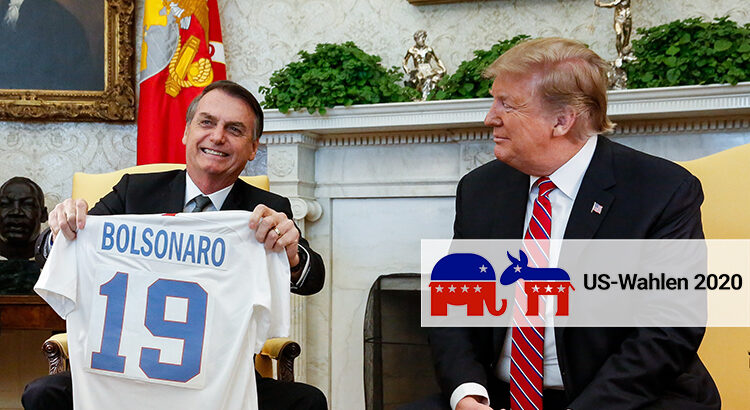With the announcement of having contracted Covid-19 in early October, US President Donald Trump followed British Prime Minister Boris Johnson and Brazilian President Jair Bolsonaro among a series of prominent politicians who have fallen ill. All three leaders have since recovered, but their recent illness is not the only thing they have in common: They are also perhaps the three most prominent figures of a global surge in right-wing populism and nationalism that has achieved significant electoral victories from 2016 onwards, yet has largely failed in its crisis management when confronted with COVID-19. The pandemic is sorely testing governments worldwide – populist or otherwise. It shows right-wing, populist governments in action, offering insights into their conceptions of expertise and popular support. Nonetheless, poor handling of the pandemic does not necessarily spell electoral danger for the “Class of 2016” populist leaders.
Three challenges of government in the face of Covid-19
The effective management of a contagious disease such as Covid-19 is a political challenge to any government for many reasons, three primary ones being (1) the necessity of rapid coordination between government agencies, (2) citizens’ trust in these agencies, government institutions and their expertise, and (3) the persistence of both, given the pandemic’s prolonged duration. These three necessities reveal weak points for populist leaders in particular.
First, emergency response requires swift coordination between numerous government agencies. This is illustrated by the Obama administration’s prescient “Pandemic Playbook” for “coordinating a complex U.S. Government response to a high-consequence emerging disease threat anywhere in the world with the potential to cause an epidemic [or] pandemic”. The playbook was infamously essentially discarded early on in the Trump administration. While sound coordination between agencies does not guarantee effective pandemic response, poor coordination makes it all but impossible.
Second, public trust in bureaucratic and scientific expertise, as well as in the government and its institutions, makes effective crisis management more likely. In contrast, populism centers around a leader’s alleged unmediated link to “the people”, sidestepping both scientific expertise and deliberative decision-making. The emergence of a pandemic requires new scientific knowledge about the disease’s spread and treatment. However, Anglophone countries – and the US in particular – show large partisan divides regarding trust in science, with right-leaning folks far less likely to show such trust. At a time in which skillful, persuasive public communication is of the essence, polarized political environments make it all the more difficult.
Third, the need for long-term, reliable strategic planning runs counter to the populist dependence on short-term public sentiment (though certain voters have shown to be fairly loyal to populists).
The populist pandemic playbook
Given these weaknesses, populist leaders have developed their own pandemic playbook of sorts: minimizing its deadly impact, offering xenophobic explanations, and promoting dubious medical solutions. The crisis has also provided populist leaders with “a unique opportunity to increase and consolidate their personal power at the expense of checks and balances in their countries”. However, “medical populism” only carries so far: Even though numbers are currently surging across the Northern hemisphere, right-wing nationalist governments fared worse comparatively in coping with the pandemic throughout the summer. Death tolls among their citizens were particularly high.
Figure 1: New confirmed COVID-19 deaths seven-day rolling average; US, UK, Brazil. Other countries can be viewed by scrolling.
Representative democracy is being challenged from two sides: populism and technocracy
The populist playbook may be countered by putting reason and expertise, but also deliberation and institutional legitimacy over the volatility of populist sentiments. Here, the representative element is critical: Reversing populism (“democracy without rights”) into technocracy (“rights without democracy”) is an overly simplistic response and may only amplify the trend of “citizens falling out of love with their political systems.” Both are elitist projects that throw out the deliberation of elected state representatives, replacing it with the alleged direct interpretation of the popular will or the dominance of pure reason. Rather, the response to Covid-19 calls for emphasizing the traditional strength of representative democracy over authoritarian populism: balancing individual rights and popular will.
Poor crisis management may not be punished at the ballot box
To be sure, the US, UK and Brazilian governments’ poor pandemic records do not necessarily spell electoral danger. Quite the contrary may be the case. Historically, from 1900 onwards, one in three populists has been re-elected, while only one in six more traditional government leaders has. Populism flourishes in times of crisis, famously in the 1930s and most recently in the wake of the 2008 economic crisis. The pandemic has once again prompted significant economic downturn worldwide. While poor public health outcomes and economic hardship in times of Covid-19 may be two nails in the coffin of contemporary populist leaders, they jointly might provide fertile ground for a new round of populism.
It is too early to confidently state whether populism will benefit politically from the current pandemic challenges. Of the three populist leaders in Brazil, the UK, and the US, Bolsonaro’s poll numbers have been high, while Johnson has been widely criticized for his crisis management. In the short term, only Trump will be confronted with a verdict at the ballot box. The months since February 2020 have quickly become the signature period of his presidency, which previously had essentially gone without a major unforeseen crisis. With Tuesday’s general election, the first major crisis of his presidency might be his last.



